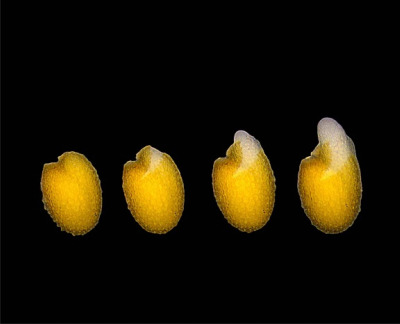
April 9, 2010, Wageningen, the Netherlands – Scientists from the Plant
Sciences
Group of Wageningen UR have developed a system for the automated
evaluation of
the germination capacity of large quantities of seed samples.
April 9, 2010, Wageningen, the Netherlands – Scientists from the Plant Sciences
Group of Wageningen UR have developed a system for the automated evaluation of
the germination capacity of large quantities of seed samples.

|
| Start of the germination of a seed of Arabidopsis, seen through a microscope. PHOTO COURTESY WAGENINGEN UR |
Details of the
system, called the ‘Germinator,’ have been published in the scientific
journal
The Plant Journal.
Germinator uses image analysis among other methods and was initially intended
for the research of thale cress (Arabidopsis thaliana) seeds. The system is
available free of charge to laboratories that carry out major research into
plant seeds, including inspection authorities, universities, research
institutes and seed companies. All will save a great deal of time and money
thanks to Germinator.
Ronny
Joosen, scientist at the Plant Physiology chair group of the Plant Sciences
Group, is one of the developers of the Germinator system and the principal
author of the article in
The
Plant Journal.
“Germinator is an intelligent combination of three elements,” Joosen explains.
“Firstly, it involves designing the test and creating the administration
required for the research to ensure that the samples are studied in sufficient
repeats and ‘at random.’ Germinator then uses image analysis to determine the
un-germinated seeds in a fast and reliable way. Unlike other systems,
Germinator does not require precise positioning of the seeds and this
flexibility means the system can be used effectively in large-scale
experiments. Thirdly, the system rapidly calculates hundreds of germination
curves, allowing for the comparison of the germination characteristics of large
numbers of seed samples.”
Germination
capacity is a very important characteristic of plant seeds. Seeds that do not
germinate sufficiently affect the initial phase of the crop, which eventually
results in lower yields or a lower yield quality. The germination percentage of
seeds is so vital that seed batches can be rejected because of it. Rejected
seed batches represent an enormous loss for seed companies.
The
research group that developed Germinator studies the genetic background of seed
quality using thale cress (Arabidopsis thaliana), among other species. Thale cress is a model plant that
is often used for biological research. However, seeds of thale cress are very
small and the challenge of manually counting the germination has prevented it
from being deployed in large-scale experiments. The development of Germinator means
this time-consuming and mind-numbing process is a thing of the past and many
seed laboratories have already started using the system.
In
addition to thale cress, Germinator is also being used to evaluate rapeseed
germination and it is expected the system will be suitable for many more plant
species. Calculating germination curves is a separate module and thus
applicable to all plant species.
The
scientists have also used Germinator in their own research, including a
successful study into the natural variation of saline tolerance in the
germination of thale cress seeds. “This study proved that by using Germinator a
single person could easily evaluate thousands of germination tests in one day,”
says Joosen. “Now we can finally start focusing on some very large-scale
experiments.”
More
information is available at http://www.wageningenseedlab.nl/germinator.
Print this page